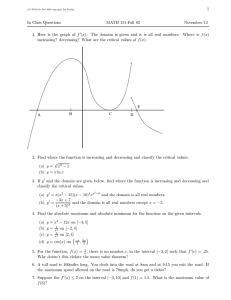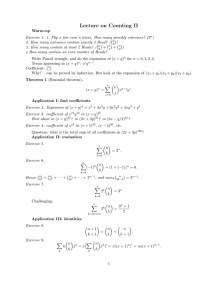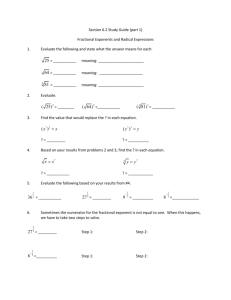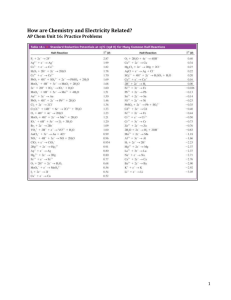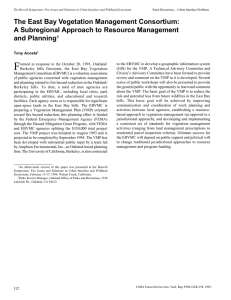8
advertisement
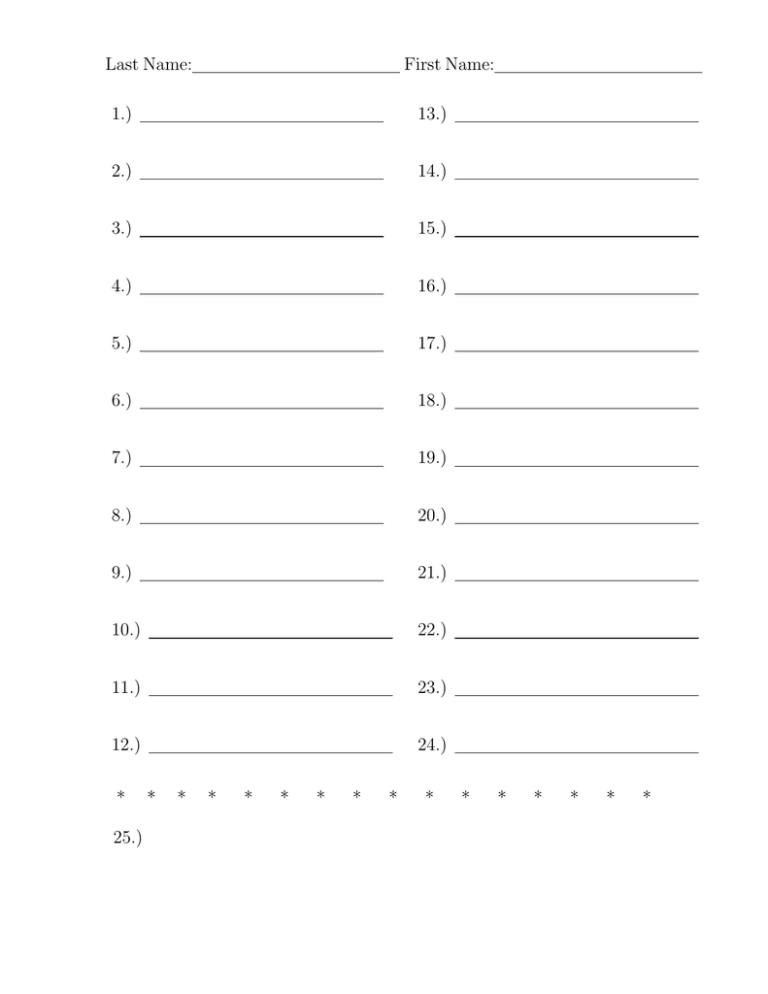
Last Name:
First Name:
1.)
13.)
2.)
14.)
3.)
15.)
8
7
4.)
16.)
5.)
17.)
S
6.)
18.)
7.)
19.)
S
8.)
20.)
2
9.)
24.) id
21.)
26.) x2
25.) f (x) = 2
2
10.)
3
It
C
5
22.)
7
8
—l
11.)
23.)
12.)
24.)
*
27.) x325.)
*
*
*
*
*
28.)
*
*
*
1
x
*
*
*
29.)
1
*
1
x2
*
*
*
2
2
2 It
3
—l
6
25.) Write out 2the product
2 (x+y) so that your fina
�
�
27.)
f
(x)
=
2
28.)
x
27.) f (x) =25.)
2 f (x)
28.) look
x like
= 2 that
26.)fnk(x)
x.2 = 2
24.) idnumbers
25.)
26.) x
It C
52 7
C3 8 2 It7 3 85 It C 52 7 3C 8 2 It7 3 58 It C 5 7 C 8
35
—l
—l 1
30.)
x
27.) x3
29.) x3
—l
—l 1
31.)
x2
28.) x1
1
x2
29.)
30.) x1
31.) x12
3
27.) x 28.) 1
x
30.) x1 8
27.) x3
31.) x12
28.) x1
29.)
1
x2
29.)
1
x2
7
29.) x3
24.) id
26.) Graph id.
1
31.) x1212
30.) x11
31.)
30.) x1
22
x
25.)
=2
26.)1 x
29.)
25.) f (x) =28.)
2 fx (x)
26.) x 28.)
2
27.)
x3 27.)
Graph f (x) =
2. x x
29.) x33
24.)
27.) id
x
S
29.)
x
28.) Graph x2 .
x)
)
2
26.) id
24.) id
26.) id
26.) x2
25.) f (x) = 2 25.) f (x) = 226.) x2
2
2
24.) id
24.) id
2
32.) g(x)
30.) g(x)
S
30.) g(x)
2
31.) h(x)
a
31.)g(x)
h(x)
7 30.)
a6
a
7
7
S
29.) Graph x3 .
1
h(x)
30.) 31.)
Graph
x.
31.) Graph
1
x2 .
32.) Graph g : [−1, 2) → R where g(x) = x2 .
6
√
6 1
3
32.)
g(x)
31.)
2 3, 4}1 → R where h(x) = x2 − 2
33.) 25.)
Graph
h
:13h(x)
{1, x2,
32.) g(x)
31.)
h(x)
1
3
2
3
23.)
−2
x
−
1
2x
−26.)
24.)36.)
id27.)
f28.)
(x)
=
2
29.)
x
30.)
g(x)
−3(x
+ 2) −28.)
1 Li. 25.)
39.)
f
(x)
29.)
27.) x
x2
30.)x g(x)
x
x2
S
S
2
3
It a 5
C
7
8
—l
3,
Li.
7
1’
3,
3,
6
Li.
7
1’
2
2
3
30.)
g(x)
30.) 27.)
g(x) x
√
37.)
24.)p(x)−x − 1
—
—
I
S
3
~+Li.
2.
2
I
28.)
1’
2.
—
3
~+
1’
1
x
2
3,
I
.5
6
2
.5
2.
6
2
7
3
7
8
~+
.5
8 2
6
7
8
29.) x12
40.)
26.) g(x)
−3(x + 2)2 − 1
2
2
—
I
2.
3
~+
.5
2
6
7
8
First Practice Exam
For #1-3, decide whether the given sequence is arithmetic, geometric, or
neither.
1.) 2, 20, 200, 2000, ...
2.) 6, 8, -7, 8, -7, ...
27.) f (x) = 2
28.) x2
3.)
-10,
10,
30,
50,
...
24.) id
25.) f (x) = 2
26.) x2
26.) id
28.) x2
27.) f (x) =27.)
2 f (x) = 2
28.) x2
24.) id4 24.) id
25.) f (x) =25.)
2 f (x) = 2
�
4.) Write
(2i−1) as an integer in standard form.
26.) x2
26.) x2
i=1
is the
implied
f(x)
17.) What is17.)
theWhat
implied
domain
of fdomain
(x) = 3xof2 −
2x + 73x2
?
31.) x12
30.) x1
55
�
29.) x12
27.) x3
28.) x1
2 as an integer in standard
form.
5.) Write1
31.) x12
29.) x3
31.) x12
30.) x i=1 30.) x1 3
27.) x
28.) x1
27.) x3
28.) x1
is the
implied
18.) What is18.)
theWhat
implied
domain
of domain of
29.)
5
1
x2
2
−5xg(x)
− x=+ —5x2—x+3
3
g(x) =
?2x+4
2x + 4
2x + 7?
—
29.)
1
x2
-2
—z
6.) Write
30.) g(x)
32.) g(x)
80
�
i as an integer in standard form.
i=1
31.) h(x)
graph offa(x).
function
f(x).
Useto
this
graphquestions
to answer q
Below is theBelow
graphisofthe
a function
Use this
graph
answer
31.)
h(x)
31.) h(x)
#19-23
#19-23.
30.)
g(x) 30.) g(x)
a
7
6
S
Li.
3,
a
aS
7
‘47
6
6
S
S
Li.
Li.
‘1’
3
a
3
-p
7.) What is the 98th term in the sequence 2, −6, 18, −54, . . . ?
27.) f (x) = 2
28.) x2
24.) id
25.) f (x) = 2
26.) x2
8.) What is the 21st term in the sequence
−10, −7, −4, −1, . . . ? (Your
2
26.) id
27.)
f (x) = 2
28.) x2
27.)
f
(x)
=
2
28.)
x
answer
24.)be
id an integer
f (x) = 2
26.) x2
24.) id should
25.)infstandard
(x) =25.)
2 form.)
26.) x2
is the
implied
f(x)
17.) What is17.)
theWhat
implied
domain
of fdomain
(x) = 3xof2 −
2x + 73x2
?
2x + 7?
—
9.) What is the sum of the
first 200 terms of the sequence 5, 15, 25, 35, . . .?
31.) x12
30.) x1
1
(Your answer should
29.)form.)
27.) x3
28.) x1 be an integer in standard
x2
31.) x12
29.) x3
30.) x1
31.) x12
30.) x1
5
3
29.) x12
27.) x
28.) x1
29.) x12
27.) x3
28.) x1
is the
implied
18.) What is18.)
theWhat
implied
domain
of domain of
2
−5xg(x)
− x=+ —5x2—x+3
3
g(x) =
?2x+4
2x + 4
-2
—z
25
10.) What does the following series equal: 100 + 25 + 25
4 + 16 + · · · ?
(Your answer should be a rational number in standard form.)
31.) h(x)
30.) g(x)
graph offa(x).
function
f(x).
Useto
this
graphquestions
to answer q
Below is theBelow
graphisofthe
a function
Use this
graph
answer
a
32.) g(x)
31.) h(x) 31.) h(x)
#19-23
#19-23.
30.)
g(x)
30.)
g(x)
7
6
S
Li.
3,
a
aS
7
‘47
6
6
S
S
Li.
Li.
‘1’
-p
3
a
4
Lj.
11.) You’re buying a car. You know which model you want to buy, but you
are given the option of 3 different colors, 2 different styles of hubcaps, and 4
kinds of new car scent. How many different types of car could you buy?
12.) You are skiing at a resort. There are 32 different runs you can ski
at the resort. You want to ski each run exactly once, so you need to decide
which to ski first, second, third,
etc. How many different decisions could you
2
27.) f (x)
=
2
28.)
x
make?
24.) id
25.) f (x) = 2
26.) x2
26.) id
28.) x2
27.) f (x) =27.)
2 f (x) = 2
28.) x2
24.) id
26.) x2
24.) id
25.) f (x) =25.)
2 f (x) = 2
26.) x2
13.) You’re on a boat with 200 people. The boat is sinking and there is
only one life raft that seats 8. How many different options are there for which
8 people to put in the raft?
14.) You are in an ice cream shop. There are 31 flavors of ice cream. You
What
is the
f(x)
2x + 7?
are building
sundae
with
a scoop
ofimplied
ice cream
a?different
17.) aWhat
is17.)
the
implied
domain
of fdomain
(x)on
= the
3xof2 bottom,
−
2x + 73x2
flavor on top of that, and a third different flavor on top of that. If it matters
1 to you which flavor is on the
31.) x12 bottom, in the middle, and on the top, then
30.) x
3
29.) x12
27.) xhow many different sundaes
28.) x1 can you make?
1
31.) x12
29.) x3
30.) x1
31.)
30.) x1
2
5
x
29.) x12
27.) x3
28.) x1
29.) x12
27.) x3
28.) x1
12
is the
implied
15.) What
is
?18.)
18.) What
theWhat
implied
domain
of domain of
9 is
(Your answer should be a natural number
form.)
2 in standard
−5xg(x)
− x=+ —5x2—x+3
3
g(x) =
?2x+4
2x + 4
—
-2
—z
h(x)
16.) If f (x)31.)
= 4x
+ 1 and g(x) = x2 + 3, then what is g ◦ f (x) ?
30.) g(x)
graph offa(x).
function
f(x).
Useto
this
graphquestions
to answer q
Below is theBelow
graphisofthe
a function
Use this
graph
answer
a
32.) g(x)
31.) h(x) 31.) h(x)
#19-23
#19-23.
30.)
g(x)
30.)
g(x)
7
6
S
Li.
3,
a
aS
7
‘47
6
6
S
S
Li.
Li.
‘1’
3
a
5
-p
is the
implied
f(x)
17.) What is17.)
theWhat
implied
domain
of fdomain
(x) = 3xof2 −
2x + 73x2
?
31.) x12
0.) x1
3
29.) x12
27.) x
28.) x1
1
31.) x12
x3
30.) x1
31.)
30.) x1
2
x
27.) x3
28.) x1
27.) x3
28.) x1
is the
implied
18.) What is18.)
theWhat
implied
domain
of domain of
g(x) =
29.)
1
x2
s6
-2
—z 26.) x2
25.) f (x) = 2
31.) h(x)
graph offa(x).
function
f(x).
Useto
this
graphquestions
to answer questions
graphisofthe
a function
Use this
graph
answer
a Below is theBelow
31.)
h(x)
31.) h(x)
#19-23
#19-23.
30.)
g(x)
30.)
g(x)
7
a
aS
7
‘47
S
6
6
Li.
S27.) x3
S
3,
Li.
Li.
1’
3,
6
-3
—a
-Z
—
I
2.
‘1’
a
1
x
28.)
2.3
3,
—I1’
~+—2
3
.5
2
—
I
2.
29.)
Lj.
It
5
6 ~+
7 .5
7
-z
6
What is
19.) What
is19.)
f (5)?
2
2
—
-p
3
—l
1’
2
5
1
x2
2
−5xg(x)
− x=+ —5x2—x+3
3
?2x+4
2x + 4
24.) id
30.) g(x)
g(x)
29.)
2x + 7?
—
7
8
f(s)?
3I
~+2.
.5 3
2
is the
of
20.) What is20.)
theWhat
domain
of fdomain
?
What
21.) What
is21.)
the
range isofthe
f ? range of
30.)
g(x)
a
f?
2
8 6
7
8
f?
22.)the
What
are the x-intercepts
22.) What are
x-intercepts
of the graphofofthe
f ? graph of
7
is the of
y-intercept
23.) What is23.)
theWhat
y-intercept
the graphofofthe
f ? graph of
6
S
Li.
6
f?
f?
1
x2
31.) h(x)
(x)
32.) g(x)
30.) g(x)
30.) g(x)
x)
a
a
7
7
31.) h(x)
30.) g(x)
31.) h(x)
a
7
Is thethe
picture
therepresent
graph of
a function?
picture
below
graph of a function?
6 24.) Does
6below
6 the
2
S
S
S
Li.
Li.
Li.
3,
3,
3,
1’
1’
1’
27.) f (x) = 2
28.) x2
24.) id
25.)
26.) x2
6 f (x) = 2
25.) Write out the product
(x+y)
so
that
your
final
answer
doesn’t
include
� n�
numbers
I that
2. look
3 2 like
~+
.5 . 6 2. 7 23 8 ~+ I .5 2. 6 37
~+8
.5
6
7
8
2k I
2
2
6
25.) Write out the product
(x+y)
so
that
your
final
answer
doesn’t
include
� �
numbers that look like nk .
—
—
—
1 id.
26.)30.)
Graph
31.) x12
x 3
26.) Graph
27.) x id.
28.) x1
27.) Graph f (x) = 2.
27.) Graph f (x) = 2.
28.) Graph x2 .
28.) Graph x23.
29.) Graph x .
29.) Graph x1 3 .
30.) Graph x .
30.) Graph x1 .
31.) Graph x12 .
31.) Graph x12 .
32.) Graph g : {1, 2, 3, 4}
x2 − 2x.
‘1’ → R where g(x) =
32.) Graph g : [−1, 2) → R where g(x) = x22.
h(x) h(x) = x .
33.) Graph h : [−1, 2) →331.)
R where
30.)
g(x)
33.) Graph h : {1,a 2, 3, 4} → R where h(x) = x2 − 2x.
a
7
6
-3
-Z
2.3
7
S
Li.
3,
-z
Lj.
29.)
1
x2
